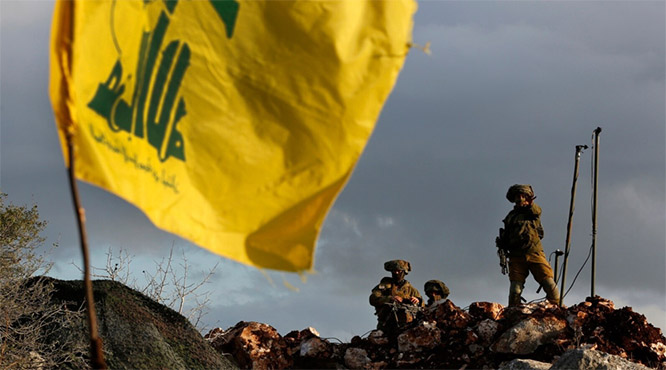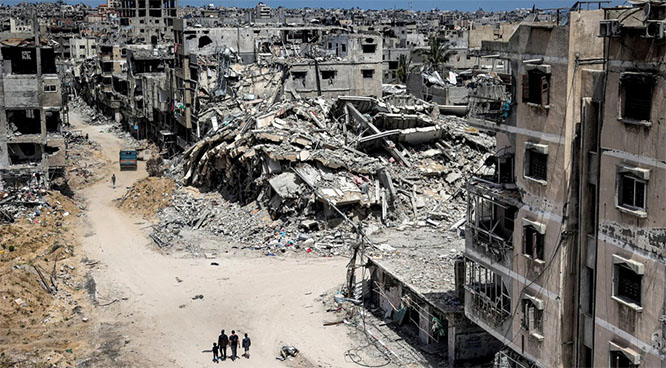Gaza/Jerusalem, May 6: Israel pounded Gaza with airstrikes and shelling Sunday killing at least 20 Palestinians, including two pregnant women and two babies, in the bloodiest fighting since a 2014 war.
Among those killed was Hamas commander Hamed Ahmed Al-Khodary, whose car was blasted in an airstrike, the first such targeted killing in five years. The Israeli military said Al-Khodary, a money changer, was responsible for transferring funds from Iran to armed factions in Gaza.
Two members of the Palestinian militant group Islamic Jihad, Mohammed abu Armanah, 30, and Mahmoud abu Armanah, 27, were likewise killed in an airstrike in central Gaza.Israel said its tanks and planes hit about 260 targets in Gaza.
Israel said its strikes were in response to more than 450 rocket and mortar attacks by Hamas and Islamic Jihad since Saturday, with Israeli air defenses intercepting more than 150.
At least four Israelis were killed in the rocket and mortar barrage. In the first Israeli civilian fatality since the 2014 war, a 58-year-old man died when a rocket hit a house in Ashkelon. Two other men were killed, one in Ashkelon and the other in the border settlement of Yad Mordechai,
With Palestinian militants threatening to send rockets deeper into Israel and Israeli reinforcements massing near the Gaza frontier, the fighting showed no signs of slowing down.
Prime Minister Benjamin Netanyahu spent most of the day huddled with his Security Cabinet. Late Sunday, the Cabinet instructed the army to “continue its attacks and to stand by” for further orders. Netanyahu also ordered “tanks, artillery and infantry forces” to reinforce troops already deployed near Gaza.
Israel and Hamas, a militant group that seeks Israel’s destruction, are bitter enemies that have fought three wars since Hamas violently seized control of Gaza in 2007. They have fought numerous smaller battles, most recently two rounds in March.
While lulls in fighting used to last for months or even years, these flare-ups have grown increasingly frequent as a desperate Hamas, weakened by a crippling Egyptian-Israeli blockade imposed 12 years ago, seeks to put pressure on Israel to ease the closure.
The blockade has ravaged Gaza's economy, and a year of Hamas-led protests along the Israeli frontier has yielded no tangible benefits. In March, Hamas faced several days of street protests over the dire conditions.
With little to lose, Hamas appears to be trying to step up pressure on Netanyahu at a time when the Israeli leader is vulnerable on several fronts.
Fresh off an election victory, Netanyahu is now engaged in negotiations with his hard-line political partners on forming a governing coalition. If fighting drags on, the normally cautious Netanyahu could be weakened in his negotiations as his partners push for a tougher response.
Later this week, Israel marks Memorial Day, one of the most solemn days of the year, and its festive Independence Day. Next week, Israel is to host the Eurovision song contest. Prolonged fighting could overshadow these important occasions and deter foreign tourists.
The arrival of the Muslim holy month of Ramadan, which begins Monday, does not seem to be deterring Hamas.
But the group is also taking a big risk if it pushes too hard. During the 50-day war in 2014, Israel killed over 2,200 Palestinians, over half of them civilians, according to UN tallies, and caused widespread damage to homes and infrastructure. While Hamas is eager to burnish its credentials as a resistance group, the Gazan public has little stomach for another devastating war.
In Washington, US Secretary of State Mike Pompeo said Israelis have "every right to defend themselves." He expressed hope that the recent cease-fire could be restored.
The UN Middle East envoy, Nickolay Mladenov, called for a halt in rocket fire and “a return to the understandings of the past few months before it is too late.”
EU foreign policy chief Federica Mogherini also called for a halt to “indiscriminate rocket attacks” from Gaza and expressed support for Egyptian and UN mediation efforts.
Previous rounds of fighting have all ended in informal Egyptian-mediated truces in which Israel pledged to ease the blockade while militants promised to halt rocket fire. Following a familiar pattern, the current round began with sporadic rocket fire amid Palestinian accusations that Israel was not keeping its promises to loosen the blockade.
On Friday, two Israeli soldiers were wounded by snipers from Islamic Jihad, a smaller Iranian-backed militant group that often cooperates with Hamas but sometimes acts independently. Israel responded by killing two Palestinian militants, leading to intense rocket barrages and retaliatory Israeli airstrikes beginning Saturday.
Islamic Jihad threatened to strike deeper into Israel, saying it "is ready to engage in an open confrontation and can open a broader front to defend our land and people.”
By Sunday, the Israeli military said militants had fired over 600 rockets, with the vast majority falling in open areas or intercepted by the Iron Dome rocket-defense system. But more than 30 rockets managed to strike urban areas, the army said.
Palestinian medical officials reported 20 dead, including at least eight militants hit in targeted airstrikes. At least four civilians, including two pregnant women and two babies, were also among the dead.
Late Saturday, the Palestinians said a 37-year-old pregnant woman and her 14-month-old niece were killed in an Israeli airstrike. The army denied involvement, saying they were killed by an errant Palestinian rocket. There was no way to reconcile the claims.
Late Sunday, an Israeli airstrike hit an apartment building in northern Gaza, killing a couple in their early 30s and their 4-month-old daughter.
The Israeli deaths were the first rocket-related fatalities since the 2014 war, when 73 people, including six civilians, were killed on the Israeli side.
The Israeli military said it struck 250 targets in Gaza, including weapons storage, attack tunnels and rocket launching and production facilities. It also deployed tanks and infantry forces to the Gaza frontier, and put another brigade on standby.
“We have been given orders to prepare for a number of days of fighting under current conditions,” said Lt. Col. Jonathan Conricus, a military spokesman.
Sirens wailed along Israel's border region throughout the day warning of incoming attacks. School was canceled and roads were closed. In Gaza, large explosions thundered across the blockaded enclave during the night as plumes of smoke rose into the air.
Hamas seized control of Gaza from the forces of internationally recognized Palestinian President Mahmoud Abbas. Despite his fierce rivalry with Hamas, Abbas appealed to the international community “to stop the Israeli aggression against our people.”








Comments
Add new comment